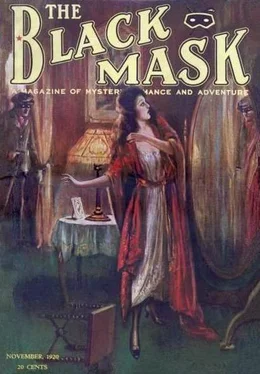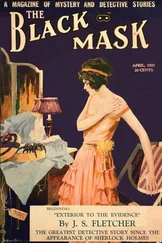Hamilton Craigie - The Black Mask Magazine (Vol. 2, No. 2 — November 1920)
Здесь есть возможность читать онлайн «Hamilton Craigie - The Black Mask Magazine (Vol. 2, No. 2 — November 1920)» весь текст электронной книги совершенно бесплатно (целиком полную версию без сокращений). В некоторых случаях можно слушать аудио, скачать через торрент в формате fb2 и присутствует краткое содержание. Город: New York, Год выпуска: 1920, Издательство: Pro-distributors Publishing Company, Жанр: Классический детектив, на английском языке. Описание произведения, (предисловие) а так же отзывы посетителей доступны на портале библиотеки ЛибКат.
- Название:The Black Mask Magazine (Vol. 2, No. 2 — November 1920)
- Автор:
- Издательство:Pro-distributors Publishing Company
- Жанр:
- Год:1920
- Город:New York
- ISBN:нет данных
- Рейтинг книги:5 / 5. Голосов: 1
-
Избранное:Добавить в избранное
- Отзывы:
-
Ваша оценка:
- 100
- 1
- 2
- 3
- 4
- 5
The Black Mask Magazine (Vol. 2, No. 2 — November 1920): краткое содержание, описание и аннотация
Предлагаем к чтению аннотацию, описание, краткое содержание или предисловие (зависит от того, что написал сам автор книги «The Black Mask Magazine (Vol. 2, No. 2 — November 1920)»). Если вы не нашли необходимую информацию о книге — напишите в комментариях, мы постараемся отыскать её.
The Black Mask Magazine (Vol. 2, No. 2 — November 1920) — читать онлайн бесплатно полную книгу (весь текст) целиком
Ниже представлен текст книги, разбитый по страницам. Система сохранения места последней прочитанной страницы, позволяет с удобством читать онлайн бесплатно книгу «The Black Mask Magazine (Vol. 2, No. 2 — November 1920)», без необходимости каждый раз заново искать на чём Вы остановились. Поставьте закладку, и сможете в любой момент перейти на страницу, на которой закончили чтение.
Интервал:
Закладка:
But he hesitated on the threshold, glancing upward where, above the black well of the stairway, there hung a faint pinpoint of gas.
Sinsabaugh was not imaginative, but — it was his last night as a bachelor — almost it seemed as if that touch upon his coat-sleeve had been a warning, a message, a summons laid upon him by the urgence of invisible fingers... nonsense!
But the murky air continued heavy, lifeless—the unwinking eye of the gaslight somehow sinister, malevolent. As has been said, Sinsabaugh was not imaginative, but now, like a swimmer breasting a tide of impenetrable and soundless flood, he mounted with slow steps the narrow stair. And about him as he went forward the darkness closed in like a wall, sinister, threatening, above and beyond him that pinpoint of gas, like an evil star now curiously bluish, flat, unreal as a flickering, painted flame.
Sinsabaugh loosened his pistol in its arm-holster, searching the thick-piled shadows massed beyond the fell circle of that brooding beacon. He drew his Colt. If Masterman awaited him somewhere upon that stair or upon the landing above, he would be ready for him. Hugging the wall, for the more silent footing there afforded, the policeman, one hand before him, feeling along the plaster, the other holding his gun, went upward steadily in the whispering gloom, eyes strained against the blackness, ears attuned to the throbbing silence, like the beating of a heart.
The gas offered no illumination beyond its flat nimbus of pale flame, but it seemed to Sinsabaugh that if he could see nothing, there yet lingered in that atmosphere an aura, a something felt yet unperceived. Something or someone had been before him on that stairway, if he or It had passed like the passing of a candle’s breath in the malodorous dark.
At the stairhead he crouched, swung up his arm, and the bright lance of his pocket flash clove the darkness in a dazzling arc to right and left. But there was nothing.
He halted at the door of his chambers—shrugged—inserted the key in the lock. The heavy, sound-proof door swung wide—r-then, following his entrance, slammed shut behind him with a muffled clang.
There came a blow at the base of his brain like the impact of a mighty hand — he staggered, stumbled, fell prone into a struggling, choking hell which took him by the throat, a rising tide engulfing him with an acrid and intolerable stench. His gun barked, once, at the convulsive pressure of his finger. But it was a dead man who fired the shot.
III
Officer Williamson, passing on his beat through Varick Street, halted a moment before No. 32, a puzzled look on his broad, good-humored countenance, For a brief instant, head in air, he sniffed upward, like a pointer—then, his face gray, he reeled abruptly against an area gate, his hand at his throat, coughing like a man in a fit.
His side-partner, turning the corner, as it chanced, at the sight of Williamson doubled over the area-gate, came on at a run, unslinging his pistol.
“What’s up, Jack?” he called; then he, too, halted in mid-career, falling to a stiff-legged walk, as an acrid stench smote him in the face in a blinding, overpowering flood. With his last remaining glimmer of sense his fist crashed into the glass of a fire-box — then he slumped into oblivion. After a moment cries echoed down the street, followed by the clang and rattle of the patrol. Men came up at a run, halted, turned back—then, out of the confusion there arose the cry of “Gas!”
But it was not until the arrival of the Rescue Squad that some order was obtained out of the chaos, when, following the arrival of the police and fire companies, the sufferers were treated with a vaporized solution of milk of magnesia, [1] Chlorine antidote.
and Williamson and his partner removed to the nearest hospital.
But as for Detective Sergeant Sinsabaugh—he was beyond their ministrations.
Gunson, Sinsabaugh’s partner and friend, was stubborn in his belief that it was not altogether an accident which had been responsible for the death of Sinsabaugh.
“It was an accident, all right—but it was planned, I tell you, Chief,” he was insisting to Inspector Murchison, his immediate superior.
“If you’re thinking of Masterman; Dave, you’re all wrong, boy,” replied Old Dan. “He’s not in on this? — how could he be? Anyway, you know what it was—th’ gas-tank exploded in Thompson’s warehouse next door, and—”
“Well—that’s all right, Chief, but how do you account for the fact—”
“—That it got into Sinsabaugh’s rooms first? Why — that it smashed through the party wall—it is only, a few inches thick there, you know—and Sinsabaugh’s rooms were right up against it.”
“Sure, Inspector—but this is what I believe—” Gunson leaned forward earnestly, tapping his knee with a blunt forefinger. “I believe that someone — Masterman, for a good guess — made that hole in the wall, pushed the tank through, and then smashed it open in Sinsabaugh’s rooms, just a little while before poor Jim came home—to die.” He paused. “Masterman knew all about tanks and gas—he was an expert—before he turned yegg—an oxy-acetylene blowpipe would have done it—easy — for him.”
The inspector grunted.
“That’s all very well, Dave,” he made answer, “but there’s one little thing you’ve overlooked—there’s one flaw in your argument: we’ll suppose Masterman, or whoever it was got into the warehouse—breached the wall—rolled in the tank—and let out the gas with a blowpipe. Well and good. Then, how do you account for the fact that the murderer—if there was a murderer — was not himself gassed? You know what chlorine is, Dave — no—it was just an accident—that’s all there is to it.” Gunson’s jaw set stubbornly. “I can’t answer that, Inspector,” he said — “I’m not going to try—just now—but as sure as—as Duster Joe Masterman came out of stir when his time was up — Jim Sinsabaugh was murdered—and you can’t make me believe anything else.”
He rose, his face grim with purpose. “You’ll give me a week—working alone?” he questioned. “That’s all I’ll ask—a week—no more.”
By way of answer the grizzled inspector bowed his head. Sinsabaugh had been one of his best men. He liked Gunson.
“Go to it, my boy,” he said heavily, “and—good luck.”
Gunson took his leave. But there was one thing he had neglected to mention to Inspector Murchison; a small thing, if you will—but a clue which had furnished him with an idea—a something he had observed at the house on Varick Street on the day of the explosion as the firemen had issued from that house of death. This he had kept to himself, but time was precious. A day might be too little—or too much.
IV
Chicken-Foot Darragh reclined against the bar at Gaspipe Looie’s. At Looie’s you can still purchase a pretty fair quality of hooch for four bits even now, and the snowbird brigade makes it a headquarters, too.
Darragh, his head wagging foolishly, his loose lips mouthing his words, retailed a story for the twentieth time, half to himself, half to a saturnine individual with a predatory nose and a straight gash for a mouth who had for some reason, bought Darragh a drink.
“Here’s luck,” said Darragh. “Well — as I was sayin’... I seen this ghost, or whatever it was, as I was goin’ in th’ basement door. It looked like—it looked like—”
He paused—shivered—drained his glass.
“Yes?” prompted his new friend. “Like what, bo?”
He spoke in a friendly tone, yet like velvet over steel, but if Darragh could have seen his face—the look in the deep-set, implacable eyes—his whistling breath might have ended in a sudden gasp.
Читать дальшеИнтервал:
Закладка:
Похожие книги на «The Black Mask Magazine (Vol. 2, No. 2 — November 1920)»
Представляем Вашему вниманию похожие книги на «The Black Mask Magazine (Vol. 2, No. 2 — November 1920)» списком для выбора. Мы отобрали схожую по названию и смыслу литературу в надежде предоставить читателям больше вариантов отыскать новые, интересные, ещё непрочитанные произведения.
Обсуждение, отзывы о книге «The Black Mask Magazine (Vol. 2, No. 2 — November 1920)» и просто собственные мнения читателей. Оставьте ваши комментарии, напишите, что Вы думаете о произведении, его смысле или главных героях. Укажите что конкретно понравилось, а что нет, и почему Вы так считаете.












